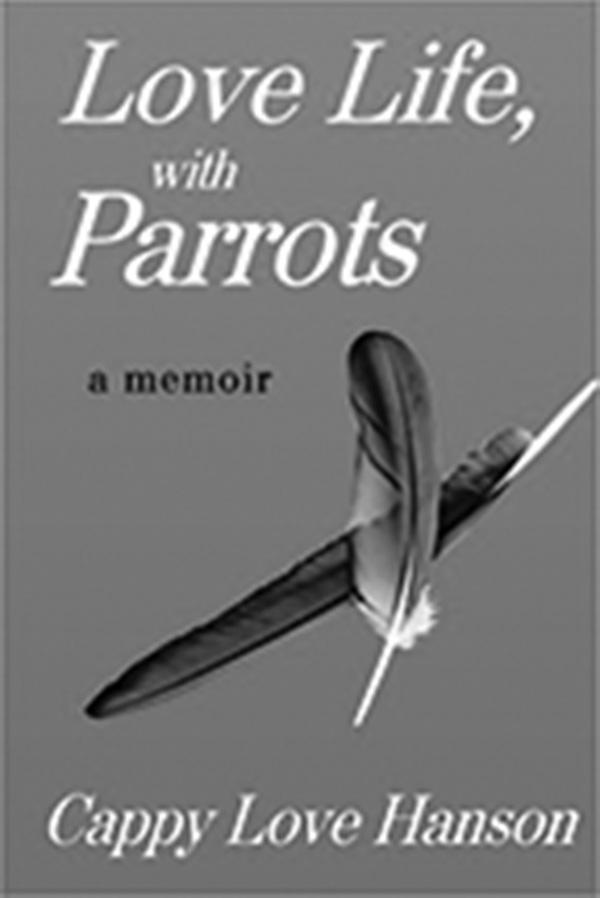
4 minute read
Interview with Cappy Love Hanson
from Mirage 2017
Interview with Cappy Love Hanson
This spring, Astrid Salinas, who is majoring in Journalism and Media Arts on the Santa Cruz campus, interviewed Cappy Love Hanson. For nine years Cappy was part of the Cochise College’s Literary & Arts Magazine, Mirage, and is co-founder of the Cochise Writers’ Group, and a member of the High Desert Writers’ Association. She is the self-published author of the memoir Love Life, with Parrots, in which she talks about her personal experiences with her parrots and her search for a partner, among other personal memories.
Astrid Salinas: When did you realize you wanted to write a memoir?
Cappy Love Hanson: That happened in 2006. I had four parrots. Peaches, the one who had been with me for 17 years, passed away. He had some kind of disease, most likely cancer. After he died, I wanted to write a book to honor him. So that’s where it started, and it went on to my writing about the context of my life. In the beginning, I wanted to write pure anecdotes about the birds, but then I realized that they had saved my sanity and life so many times. I found the love of my life during the process of writing the memoir. So this book is also encouragement for people in their senior years; you are never too old to write or to find love. I was 57 when Dennis and I got together. Suggestions about my writing came often from my writers’ groups, Cochise Writers’ Group and the High Desert Writers’ Association.
Salinas: What was the process of writing this memoir?
Hanson: Here’s what I did: I sat down and wrote down a rough draft that included everything that I could think of, related to the birds. Just everything! I didn’t edit it at first. Then I went through the manuscript, made it much more readable and sent it to my
writers’ group, and they gave me their critique. I got wonderful critiques from both groups. So then I went once again through the manuscript, with all the feedback I’d been given, and it looked much clearer, and I was seeing where the book would go because at the beginning I didn’t have a clear idea of what I wanted to do. Once again, I received critiques on the book. I did my final draft and self-published with CreateSpace and Amazon; I put it out as an e-book.
Salinas: Do you have any favorite writers?
Hanson: I’m a big fan of people who write memoirs that include their experience with animals. There was a book I read called Arnie the Darling Starling by Margarete Sigl Corbo and Diane Marie Barras. Susan Richard, who had horses and dogs, wrote about her childhood, but also about how her relationships with her animals affected her ability finally to have a human love in her life. There was also Joy Adamson, with her wild feline books. I am 70 years old now, but when I was 20, I was reading Joy Adamson, and it had a long-term effect on me. That’s really where I got interested in books about animals.
Salinas: What would you recommend to writers who want to write a memoir?
Hanson: The first thing I would do is make a list. What are your passions and interests in life? It could be birdwatching, chemistry, science fiction, anything. It helps you see where your passions are. The next thing I would do is to take any one of those and start freewriting. Do it by hand, write for 10 or 20 minutes at a time. Just see what comes up; the thing about memoirs is that the more you write the more you will remember and the more you will want to write about. Another thing that is difficult for anyone writing a memoir is fearing that someone you are related to or whom you have a relation with will get angry or will be hurt. My advice about that is to write
a draft that no one sees. Write the things that may hurt some feelings, write what may anger some people, and put it away so you can think about it for a while. Usually, after a few edits, people don’t get as upset as we anticipated. You can’t go wrong with writing memories or family stories; they are a personal resource. If anyone wants to write a memoir, he or she should at least try.
Salinas: How did your passion for parrots start?
Hanson: I was living in Southern California, working at a computer chip manufacturing company. A guy came in with his parrot, and I looked at this little bird and how affectionate he was with the guy. I was just divorced from a previous partner, so I realized that I needed that kind of affection. That’s when I thought of having a parrot of my own. I have always loved birds; I was a birdwatcher before that experience and have loved birds since I was a very young girl. But when this guy brought his parrot to work, I was in love with parrots since then. They’re smart and have such complex personalities; they are wonderful!


